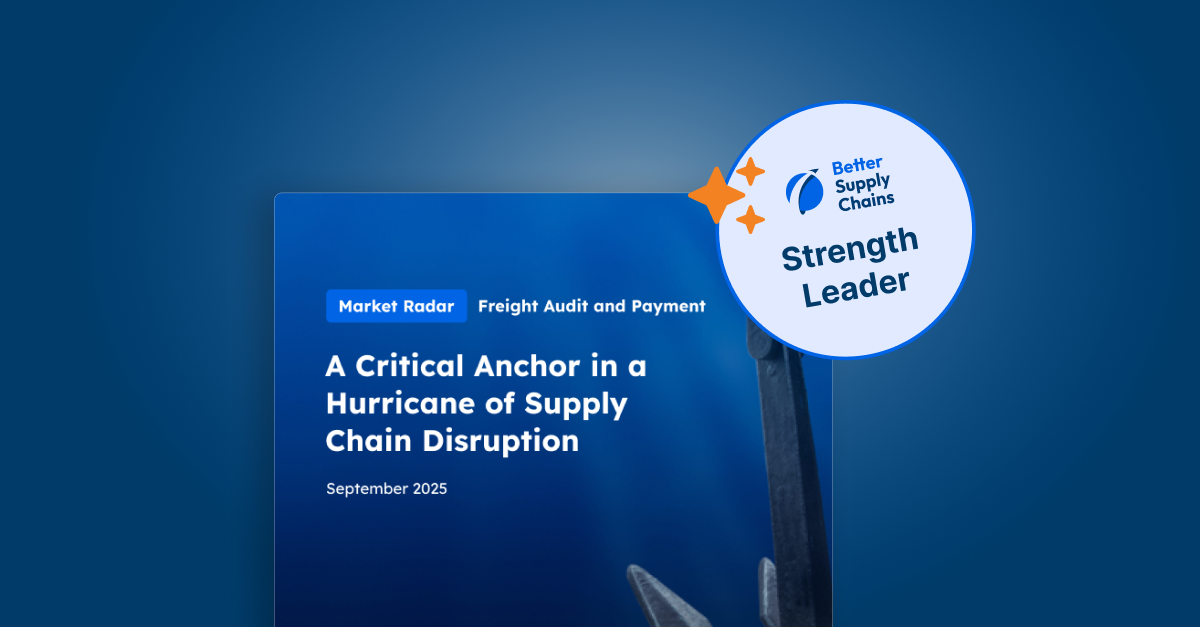Reducing Revenue Leakage: The Claims Management and Freight Audit Advantage

Tackling the complexities of the freight and logistics industry can feel like running a course on Ninja Warrior. It's intense, right? You're dodging obstacles left and right, from tricky pricing strategies to the headache of mismeasured freight—essentially a freight audit in action—that alone can knock up to 25% off your profit. Yeah, that's like slipping on the warped wall because of a misstep—it hurts.
Now, imagine claims management with cutting-edge tools like freight audit software as your secret weapon or coach whispering strategies in your ear, teaching you how to nail every jump and boost your revenue by 2–5%. Beyond getting past one obstacle, it's about mastering the whole course with less sweat. Plus, instead of worrying about fixing what went wrong after the fact, it’s about making smarter moves from the start, so you're not just surviving; you're thriving and pocketing savings. Let's dive into how.
Understanding Revenue Leakage and Its Causes
Revenue leakage is a sneaky hole in your wallet where dollars quietly slip away, often unnoticed. It's all the cash you're missing out on due to errors, inefficiencies, or overlooked details in your operations. Surprisingly, this isn't a rare challenge; about 42% of companies grapple with some form of revenue leakage, and it's especially catastrophic for small transport companies. In fact, for those with a yearly turnover of $10 million, leakage could mean over $300,000 vanishing into thin air.
Common Sources of Revenue Leakage
Let's spotlight the three culprits often lurking in the shadows: lost paperwork, mistakes in charges, and unrecorded services.
First, picture the chaos when crucial paperwork goes missing. It's more than a misplaced document: freight getting lost, shipments sent off-course, and goods stuck in limbo. With companies shelling out up to $220 to recreate a lost document and nearly $20K annually per worker wasted on document-related delays, the costs stack up fast.
Then, there are the slip-ups in charges—think of it as the financial equivalent of tripping over your feet. Faulty processes and inaccurate data lead to pricing mistakes, over or underestimating shipping costs, and inadvertently giving away services. It’s like aiming for a moving target blindfolded, with 53% of companies also navigating the tricky waters of setup fees, which average around $548.52.
Lastly, unrecorded services are the silent profit eaters. Imagine providing top-notch logistics services, from warehousing to optimized route planning, and not billing for them. It’s like cooking a gourmet meal and forgetting to serve it. These offerings become ghost services without proper tracking and billing, contributing to significant revenue loss.
The Role of Freight Claims in Revenue Leakage
When freight claims fumble, it's not just about the headache of mishandling; it's the revenue that silently bleeds out, impacting your bottom line in more ways than one. Picture launching a product just to have shipping delays, pushing everything back, driving your customers straight into the arms of your competitors. The costs don't stop at lost sales; they spiral into extra storage and handling fees for that delayed inventory.
Then, there's the maze of special or consequential damages. It's like throwing a party where the main guest—the cargo—shows up late or not at all, leaving you to foot the bill for all the wasted preparations, from storage fees to extra labor costs. And if a claim doesn't get recovered? You could wind up needing to drum up an additional $20,000 in sales to compensate for an unrecovered $1,000 cargo claim, especially if you're playing the game with a slim 5% profit margin.
Additionally, carriers have their own rulebooks, making a uniform approach to claims elusive. Some might cap their payout at $100 per shipment. In contrast, others calculate by weight, leaving you to decipher a wide range of potential reimbursements. Plus, don't fall for the myth that carriers are always at fault. Sometimes, the responsibility lies with shippers or logistics providers, turning what should be a straightforward process into a complex puzzle. And when it comes to claims processing, the timeline stretches and bends based on the claim's complexity, the carrier's response speed, and how solid your evidence is.
The Claims Management Process
From filing to resolution, claims management is a multifaceted process. Think of every piece of evidence and every bit of paperwork, along with savvy negotiation and strategic decision-making, as a means to an end for a successful final goal: a resolved claim.
Key Challenges in Claims Management
Claims management in logistics is a wild ride with several common challenges. Picture trying to hit a moving target when deadlines for filing and processing claims shift with the type of freight and contract specifics—hello, deadline confusion. Then there's the puzzle of liability. When cargo's under a carrier's watch, you'd think they've covered it, right? But toss in a bill of lading (BOL), and suddenly, it's anyone's game, from shippers to logistics providers.
And then there’s the paperwork—every BOL, invoice, and customs form must be spot-on. Slip up here, and you're in for a world of frustration. Finally, there's the detective work: gathering evidence. Was it damaged on your watch or theirs? Got photos? Without slick data collection, piecing together what happened feels like solving a mystery with half the clues missing.
Best Practices for Effective Claims Management
Effective claims management requires a blend of vigilance and strategy, starting with razor-sharp documentation and crystal-clear communication. Then, knowing the ins and outs of carrier policies and leveraging technology's help to organize documents and track makes claims less of a chore and more of a streamlined process. Legal insights often turn complex situations into navigable paths, especially when policies and procedures get tangled. And on the proactive side, extending pricing agreements and making smart adjustments based on indexes keep costs predictable. Tight collaboration with partners and strategic planning, like choosing damage-resistant packaging and ensuring labels are spot-on, further mitigate risks before they balloon into issues.
With 96% of organizations leaning into inspection solutions, the importance of regular checks is undeniable. This is especially true considering trucks travel about 100,000 miles annually, and inspections occur every 104,000 miles.
Technological Advancements and Claims Management
Technological advancements are paving the way for smarter, more efficient operations. With cutting-edge tools like freight audit software leading the charge, we're witnessing a revolution in claims management that promises to transform the industry.
The Impact of Transport Management Systems (TMS)
Thanks to TMS, the manual tasks that once bogged down transport management now fade into the background. With transport management no longer the migraine it once was, employees can now pivot their focus toward what matters: strategic pursuits, productivity, and innovation. In such a workflow where, effortlessly, customer details find their way into the right place and get applied with unmatched accuracy, the goal here extends beyond replacing the human element to refine the workflow into a smoother, more reliable operation.
Moreover, when managing data, TMS stands out for its efficiency. It simplifies every step, from the initial input of consignment details to the final delivery confirmation with a swift digital signature. Furthermore, in the complex arena of billing and invoicing, TMS introduces a level of precision that effectively safeguards revenue, ensures every transaction is spot-on, and minimizes errors. This transformation doesn't just maintain the status quo; it injects a new sense of vitality into the financial proceedings, turning claims management from a tedious task into a streamlined, error-free engine.
Benefits of Claims Automation
Claims automation is a game-changing approach that turns the claims process from a headache into a breeze with the help of automation tools like AI, anomaly detection, and natural language processing.
The benefits of claims automation unfold in broad and profound ways. Imagine cutting operational costs by a significant 30%, as highlighted by McKinsey, while simultaneously smoothing out the entire process. It's about breathing new energy into efficiency, enabling companies to handle a higher volume of claims with remarkable speed and absolute accuracy. Consider the shift away from the old challenges of manual errors—those costly mistakes that lead to overpayments or wrongful denials. Claims automation steps in as a protector of revenue, effectively stopping the financial bleed caused by the need for manual do-overs and constant vigilance, leading to a leaner, more secure financial footing.
The Strategic Advantage of Optimized Claims Management
Streamlining claims management does more than tidy up processes; it offers strategic advantages that ripple through every facet of an organization. Here’s how a sharpened focus on optimized claims handling can elevate your operations and set you apart:
- Boost Customer Satisfaction and Trust: Start with the customer in mind. Automated, transparent claims processes make life easier for your customers, directly lifting satisfaction and loyalty. Keep them in the loop with real-time updates and clear communication, turning a potentially frustrating process into a trust-building opportunity.
- Ramp Up Operational Efficiency: Lean into technology to do the heavy lifting. Automation frees your team to focus on what matters, transforming traditional practices into efficient, streamlined operations. Embrace best practices to smooth out workflows and ensure every step of the claims process is as efficient as possible.
- Guard Your Financial Health: Keep a keen eye on reducing leakage to bolster your bottom line. Minimizing errors in underpayments and denials secures revenue, ensures compliance, and streamlines operations. This strategic vigilance pays off in terms of both financial stability and customer satisfaction.
- Carve Out a Competitive Advantage: Make your claims process your crown jewel. In a crowded market, efficient and sustainable claims handling can distinguish you from the competition, turning challenges into opportunities to lead.
- Use Data for Ongoing Refinement: Data isn’t just numbers; it’s intelligence. Use claims data to gain insights that drive operational improvements and risk reduction. Foster a culture that sees data as a tool for continuous growth, using analytics to fine-tune your approach and enhance efficiency across the board.
The Time is Now: Step Up Your Claims Management Game
Minimizing revenue leakage in the freight and logistics world is all about managing claims effectively. Investing in top-notch tools, technologies, and processes is the key to keeping operations tight and customer satisfaction high. The underlying message is simple and straightforward: better claims management means a healthier bottom line and happier customers.
That's where Intelligent Audit, one of the industry’s top freight audit service providers, steps in. With 27 years under its belt and over $1B in shipments audited just in 2023, Intelligent Audit isn't just playing the game—it's changing it. Imagine having a partner trusted by 20% of Fortune 50 companies, offering a wealth of services like freight audit, business intelligence, secure carrier payments, and more. It's about giving all sizes of businesses, from SMBs to global giants, the keys to the kingdom to drive higher ROIs, slash inefficiencies, and provide crystal-clear insights for making smarter moves.
Ready to transform your claims management? Get started with Intelligent Audit. It's your move to make shipping faster, cost-effective, and simply more intelligent.



